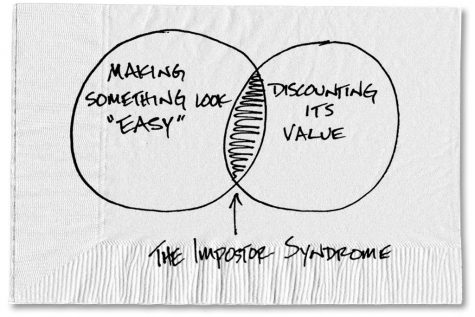Living With Impostor Syndrome
I am a fraud…
That’s what goes through my head every time I accomplish something, or any time I submit an assignment, or even when I speak to someone. That’s what’s in my head 24/7.
It is exhausting to feel like this, even when I feel proud about something I did, there’s always that voice inside of my head saying: it’s not perfect, you can do so much better.
The Uninvited.
I don’t remember when this voice decided to move in my brain, but she has dominated all my thoughts and opinions about myself.
This voice, she’s mean. Ruthless. She doesn’t apologize for all the mean things she tells me.
I have always felt comfortable with public speaking, that was until the “voice” came about, now every time I have to speak in front of a class, she makes me rehearse it one, two, three times.
I have to repeat it, meticulously calculate it, analyze every single word.
I finally open my mouth, and everything I rehearse is completely muddled.
She laughs at me and says I knew you wouldn’t do it perfectly.
***
This “voice” in my head is commonly known as a psychological disturbance, it is also called the “impostor syndrome.” Psychologists often call it the impostor phenomenon, this syndrome makes people d oubt any skills or accomplishments they have or make.
oubt any skills or accomplishments they have or make.
No matter how much external proof that I have of succeeding, there’s always that feeling that has me convinced that It’s not good enough.
Both women and men can have impostor syndrome.
This syndrome can make you think that you’ve only succeeded due to luck, and not because of your talent or qualifications. The imposter phenomenon was first identified in 1978 by psychologists Pauline Rose Clance and Suzanne Imes.
There’s no concrete study as to why a person develops impostor syndrome, but there have been connections between personality traits, and anxiety issues that can cause this syndrome. Some experts speculate on family and behavioral causes. For example; If you were raised with certain expectations of perfection, like having the perfect grades, or always feeling pressured to win on your sport’s team then you are more likely to develop this issue.
I have an incredibly talented uncle who’s an engineer, and he’s probably one of the smartest people I know, yet he feels like he’s not intelligent enough. It’s hard going through it; it is even harder knowing someone going through it. Especially when this person is someone I have always looked up to.
It affects my syndrome by thinking if he’s this exceptionally brilliant person, yet he still feels like he’s not good enough; what makes me think I can feel like I’m good enough? (It makes sense when is say this in my head.)
The expert in this syndrome, Valerie Young, who wrote a book on the subject called, The Secret Thoughts of Successful Women says that other factors such as environment or institutionalized discrimination play a major role in psychology.
“The more people who look or sound like you, the more confident you feel. And conversely, the fewer people who look or sound like you, it can and does for many people impact their confidence,” says Young.
It’s strange how much I can relate to what she says. When I moved to the United States, I always felt like I didn’t belong. Speaking up was always hard for me; I didn’t sound like everyone around me who was native to the English language.
I still struggle to be confident when speaking, as I feel like I need to improve my articulation or my vocabulary. I’m always constantly trying to perfect my speech, and I frustrate myself for not sounding “perfect” all the time.
I’m trying to free myself from this “voice” and the notion of not being good enough. I have to remind myself how far I came to push myself to move forward.
I will not let the voice win.

Nicole Alarcon is a senior at Mercy College, majoring in journalism. Born in São Paulo, Brazil, she moved to the United States at 10-years-old.
Nicole...













